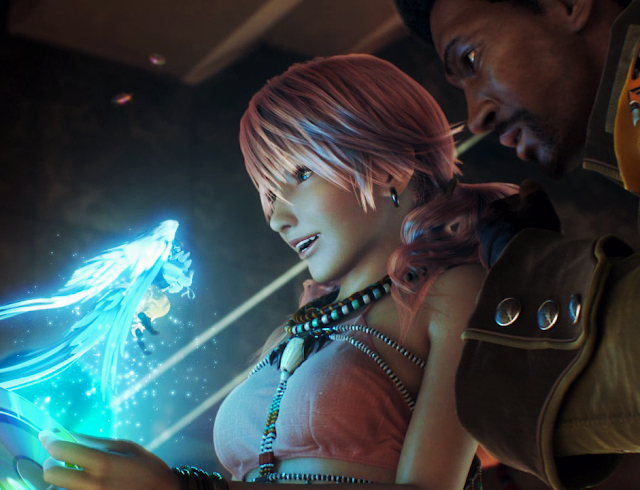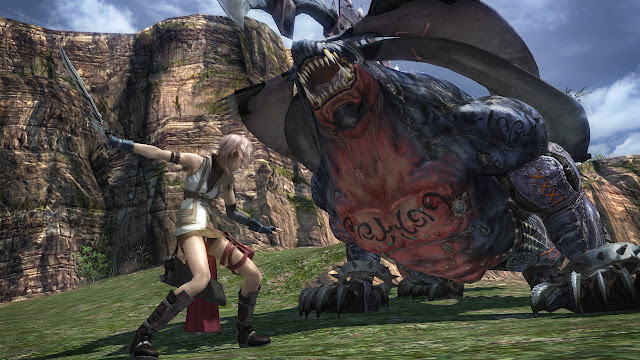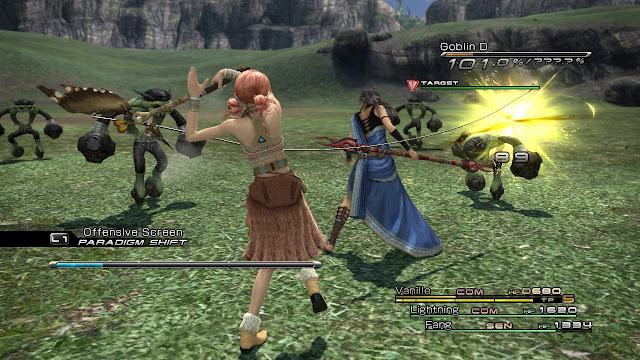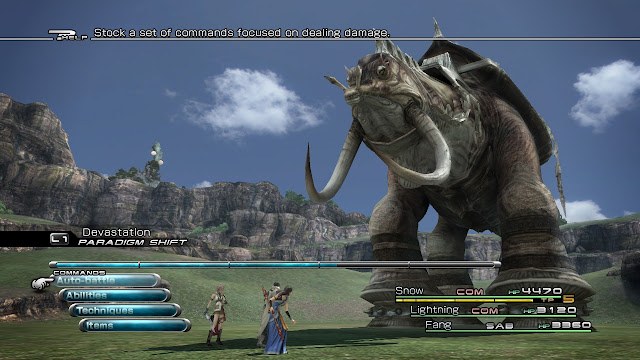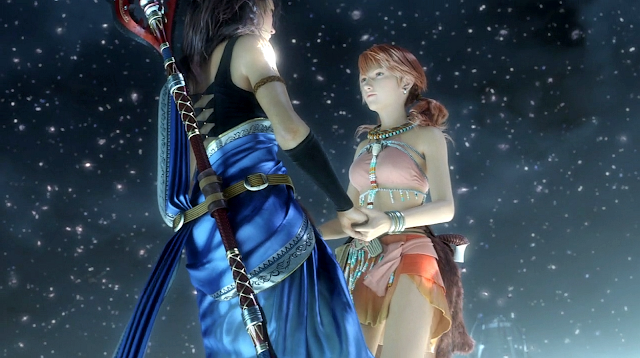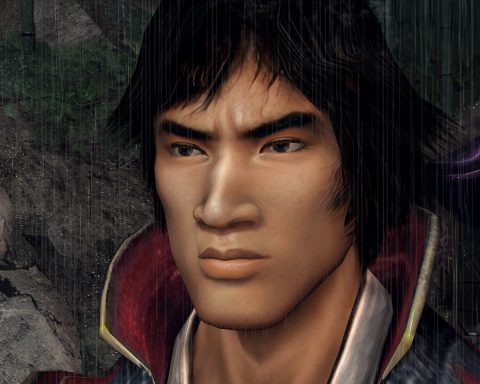Game theory by Matt S.
Nope. It is actually quite brilliant.
That would be a pretty short article if I left it at that, I guess, so I’ll elaborate. Back when it as first released, the strengths of Final Fantasy XIII were largely overlooked (and still are), while its weaknesses were overly aggressively targeted for criticism, meaning that, on balance, the game has been unfairly maligned when, in reality, it’s actually well worthy of its place in the venerable series.
Final Fantasy XIII was a controversial title, in a beloved series that has had its fair share of controversies, but nothing to quite this scale. Though it was met with a reasonable level of critical praise, averaging 82 at Metacritic, that number is significantly below what you might expect for a numbered Final Fantasy game.
The reader response has been pretty polarising, too, with around 70 per cent of player reviews for the most recent Steam release of the game being positive. Again, for a series that threw up VI, VII and X, all utterly beloved, defining entries into the JRPG genre, it’s hard to see the game as anything more than a disappointment by the series standards.
As usual, though, the numbers don’t give the full picture, and when you start to delve into why the game has the response that it has, it’s equally difficult to look at Final Fantasy XIII and not think that the game is more misunderstood than genuinely bad. In fact, the game’s really quite intelligent, dwells on worthy social and philosophical issues, and has a really valuable narrative – something that is rarely noted in those reviews or online discussions.
What is a common thread when people talk about Final Fantasy XIII is disappointment with its perceived linearity. Essentially, people were upset that through much of the game they were running down corridors with little room for deviation. This is a complaint that I find to be absolutely fascinating, because all Final Fantasy games are linear, and yet this one is the only with which that linearity is an issue.
Whether you’re playing Final Fantasy 1, VI, VII, X or XIII you are following a sequence of events that the game designers have set upon you. You’ll visit the same places in the same order, fight the same bosses at the same time, and witness the same narrative sequences with no control over how they play out. Some of the Final Fantasy games – VII, for the classic example – try to hide that linearity behind smoke-and-mirrors; you’ve got the illusion of control because there are optional side quests and even characters to recruit (Vincent <3), but it is exactly that – smoke-and-mirrors. No matter what you do, Aerith is still going to die.
While it is true that Final Fantasy XIII isn’t consistent in offering side quests, or towns to visit in between enemy-filled dungeons, it does concentrate a lot of that content into one large open-world segment – Gran Pulse – most of which is very optional. Otherwise, the game tightly focuses you on corridors-and-cutscenes, yes, but I would argue that’s a strength of the game. Final Fantasy XIII is a very big game, and has a bulky, challenging story that it wants to pull you through. Much of the impact, both emotional and intellectual, of that story is filtered through the game’s pacing. If you think about open JRPGs, like Xenoblade Chronicles X, throughout much of the experience the narrative takes a back seat to the storytelling, but were Final Fantasy XIII to do that, much of its design principles, where the game’s structures exist to support the narrative, and not the other way around, would start to crumple. In short, the story simply wouldn’t work if it was not hyper-linear.
If you were to think of Final Fantasy XIII as something closer to a visual novel or “walking simulator” than a traditional “game,” I wouldn’t disagree. There’s very little that goes on within the game that isn’t trying to get you to focus on listening to the characters, or anticipating the next cut scene, or using the gameplay moments to muse on what has just transpired. Now, you could perhaps argue that as the very definition of AAA in the JRPG space, Final Fantasy XIII’s development team was taking a great risk in shifting focus from a holistic gameplay point of view in order to tell a more intimate story, and sure, there’s a case to make for that. But commercial wisdom aside, if this was not labelled as a Final Fantasy game, I do suspect the experimental design principles that drive the game would be far more lauded. It seems that this game was a victim of its label, and people’s preconceptions on what they should get from a Final Fantasy title.
As for the narrative itself… well, it was a bit of a victim itself. Unfortunately for Square Enix, Final Fantasy XIII’s narrative was intensely Japanese in its theme, which in turn meant that it struggled to resonate with western culture.
For example, I’ve seen a lot of commentary about the game over the years lambast it for its focus on themes around fate and duty – two relatively uninteresting concepts to our culture, which is quite firm on our right to determine our own fate, and our responsibility is to put ourselves over family, much less nation.
But it’s a different story to the Japanese. Real world Japanese culture is in the throes of an almighty struggle between older traditional attitudes and the modern expectations of people growing up and living within a globalised world. Populations are shrinking in rural areas because people are moving to the cities en masse to pursue careers of greater interest or opportunity to them. Family businesses that have been running for generations five, 10, 15 generations now have no heirs. There’s a palpable sadness and nostalgia for a time where traditional Japan was enough (even for the youth), but that nostalgia is losing the battle to the lure of modernity.
Final Fantasy XIII is, to its core, a discussion on that topic. Each of the heroes is marked, and find themselves questioning whether they fight that destiny to take control of their own lives, or do they submit for the (perception of) greater good? When almost every line of dialogue runs around this theme, it’s easy to see how a mainstream audience in the west might struggle to connect with something so fundamentally alien, but to the Japanese, this is a serious conversation that they need to have.
(Note: yes, I am aware the game is controversial in Japan as well, but it is for different reasons, and I’ve rarely seen the themes of the game dismissed or derided in the game’s homeland).
Another key theme to the game was also always going to come across as difficult to us in the west. In most of the other Final Fantasy games, the summons are simply cool monsters that we can bring on to the battlefield to help us take on the enemies. In Final Fantasy XIII, they served a more symbolic purpose, as personal demons that each character needs to overcome on a journey of self discovery, that is every bit as important as the more overt quest that the characters are taking on as a group.
This idea of battling something that reflects an inner aspect of yourself is quite common in Japan – think Persona, Final Fantasy IV, and even Shadow Link from The Legend of Zelda: Ocarina Of Time, and while the success of those games would suggest that people are on board with the theme even out this way, in Final Fantasy XIII that theme is far more abstracted, and it seems that distanced people from it more.
The game in general is quite dense, and asks players to unpack it to a far greater degree than most big budget games. This is, in effect, Final Fantasy XIII’s most significant failing. It expects players to do a great deal of work in unpacking it, and while that’s perfectly fine for a smaller-scale game or independent project, the more complexity you introduce to a blockbuster game, the more you challenge a player’s capacity and comfort level for narrative analysis, and not everyone wants to do that. What do you end up with as a consequence are people that find the game distant, unengaging, and for something so honed on storytelling, dull.
But Final Fantasy XIII is intelligent. Certainly it’s dense enough to deserve a place in the “art game canon,” and it’s a game that I’ll be returning to for future editions of this little series of articles. The sequels, too. Lightning Returns is one of the most academically weighted games ever designed. Half the population was never going to get along with these games, but looking beyond their base entertainment value, they’re all far better than most give them credit for.
– Matt S.
Editor-in-Chief
Find me on Twitter: @digitallydownld

